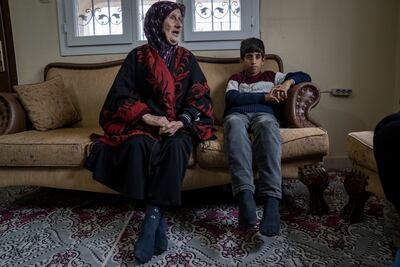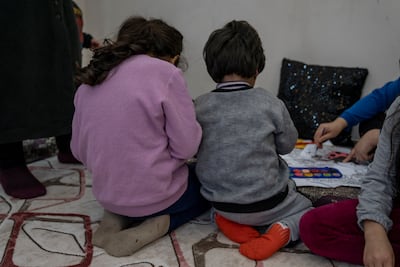Omar was sleeping peacefully next to his older brother in their home in Antakya, the capital of Turkey's Hatay province, when the earth started shaking violently in the middle of the night.
The first tremor was enough for him to swiftly leap off the bed. He shook his brother, Youssef, to rouse him, but he was a heavy sleeper.
While Omar managed to flee their home as it started to crumble, Youssef did not wake up in time.
The 15-year-old was trapped under a wall as the house turned into a tomb. His body was pulled from the rubble three days later.
Omar, now 12, vividly remembers that night, on February 6 last year, when a powerful 7.8-magnitude earthquake rocked Hatay and 10 other provinces in southern Turkey, killing more than 50,000 people.
His voice is calm but the tears in his eyes betray his trauma as he describes how he rushed outside the collapsing house, calling for help from the neighbourhood.
Omar and his grandparents, who were trapped inside the house but rescued the following day, now live in a container designated for orphans and widows in the town of Reyhanli, on the border with Syria. Antakya, 40 kilometres away, still lies in ruins.
They survive on Omar's stipend from NGOs as his grandparents were injured during the earthquake and can no longer work.
Omar is one of four million children across Turkey who were affected by the earthquake, according to Unicef.
But, as a Syrian refugee, it was not the first tragedy to strike his short life.
Along with millions of other Syrians fleeing the civil war in their country, Omar's family moved to Turkey when he was just an infant.
His father died in the war and his mother abandoned her sons, leaving them to be raised by their grandparents.
“I raised two orphan children. I never thought I would lose one of them,” their grandmother, Nafle Ido, 62, said.

For the roughly two million Syrian refugees who live in the Turkey's earthquake-affected regions, the disaster only added to the grief of loss and displacement because of the war.
Children are especially at risk of post-traumatic stress disorder (PTSD) from the harrowing scenes of death and destruction after the earthquake, with symptoms including flashbacks, anxiety and behavioural issues, said Khaled Al Jadouh, a psychologist for the Syrian American Medical Society, known as Sams, told The National.
“Mental health needs for war-traumatised Syrian refugees have been gigantic since the earthquake,” Mr Al Jadouh said.
“Especially here in the province of Hatay, as it is one of the most impacted regions.”
The society has set up two mobile units to provide mental health support for children in Reyhanli, where many Syrian families from Antakya now live.
Omar, who joined the Sams programme a couple of weeks ago, is one of the 600 children in the area who received help from the society's mobile team in January.
“Omar had PTSD after the earthquake, but he is doing much better now,” Mr Al Jadouh said.
“I used to never speak about what happened. It is only here that for the very first time I spoke about the earthquake,” Omar said.
“It feels good.”
As a Syrian refugee in Turkey, a group that has been facing increasing racism in recent years, this may just be the beginning of the journey for the young man.
'Gigantic needs'
The need is such that Sams will soon open a health centre with a team of doctors and psychologists in Reyhanli for Syrian refugees, Mr Al Jadouh said, sitting in its new office.
The centre is awaiting official permission to open, but until then the Sams teams continue to visit orphanages, NGOs and homes to provide private and group sessions.
“We found ways to channel trauma through speech, play, drawing and singing,” said Yasmina, a Sams psychologist who asked that her full name be withheld.

On the day she spoke to The National she was visiting Sara Aldili, 28, and her family, originally from the Syrian province of Idlib.
Ms Aldili's husband died in the earthquake while trying to save their son. The boy was pulled out of the rubble alive but needed treatment in a hospital for three months.
She left her rented home in Antakya and now lives in a building for widows, paid for by a private charity, along with her five children.
“The earthquake has mentally exhausted my children. It's not easy what they have been through.
“I would have killed myself if I had been through such traumas, but I have to stay strong for my children,” Ms Aldili said as they played cheerfully around her, the youngest with his face caked in layers of paint.
There was no outward sign of the tragedies they had faced, but Yasmina said they had “been through a lot, from the bombs, the earthquake, to being buried alive”.
Ms Aldili said that Sams' programme helped not only her children but also herself.
“My well-being has improved a lot since I met them.”
A lengthy battle
Although the need for help with mental health problems is immense, the stigma attached to getting it remains an obstacle, Mr Al Jadouh said.
“It is improving, but many, especially adults, are hesitant to seek help.”
Despite an increase in efforts to help them, there is always a gap in meeting the needs of quake-affected Syrian refugees, some of whom are simply out of reach.
“No matter how much we work, there will always be needs that we cannot meet because they are so important,” said Nizar Alqayem, the programme director of Sams in Hatay.
A few kilometres away, about 70 Syrians affected by the earthquake living in a muddy camp of makeshift shelters have not received any form of health assistance in more than a month after an NGO suddenly stopped visiting.
The whole camp lives in destitution, especially the dozen widows and their children who have barely enough to survive.
“Most of them are above 12 [years old]; that’s usually when associations stop giving financial help for children who lost their father,” said Sheikh Ahmad, who set up the camp after the earthquake.
The children at the camp, as well as the adults, live in constant fear of another earthquake.
“It’s not that we can afford rent anyway, but my daughter is petrified by the idea of living in a concrete house, so we’re staying here,” one of the camp's residents said.

